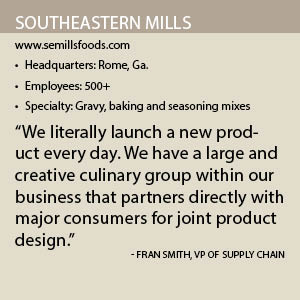Southeastern Mills
Southeastern Mills’ supply chain leader is revamping the company’s processes.
By Kat Zeman
Maximizing efficiencies in the supply chain is an ongoing challenge in many of industries today. Businesses and organizations are reviewing, renewing and revising their processes to supply their end-users with products and services more efficiently and at a reduced cost.
In the past, dedicating an entire department to the supply chain was common only among large corporations. Today, small- to mid-sized businesses are seeing its benefits, too. Rome, Ga.-based Southeastern Mills is among those companies that are starting to increase their focus on supply chain efficiencies.
In 2016, the company created a new supply chain leadership position. “Most of the company’s supply chain functions were in place to some degree, but it didn’t have a supply chain leader,” says Fran Smith, who took over the leadership role as the company’s vice president of supply chain.

Integrated Environment
Since taking over, Smith has been on a mission to revamp the company’s supply chain processes. One change he’s already made is the optimization of its SAP system to tie various functions together. The ERP software enables companies to better run their business processes by creating an integrated environment among its various departments, customers, vendors and distributors. “It allows everyone to share information,” Smith says.
To optimize the new system, Southeastern Mills hired Naperville, Ill.-based Reveal, a consulting firm that specializes in comprehensive, end-to-end SAP-centric supply chain management services. “Reveal stabilized the implementation and helped us customize for our businesses,” Smith says. “It took our company through the first phase of SAP optimization and it has driven a lot of value for us.”
Smith’s goals for Southeastern Mill’s supply chain include expanding its distribution footprint, improving visibility and flexibility with suppliers and customers, and shortening lead times. “We are continuing to expand on our year one successes,” Smith says. “We expect double-digit, inventory reduction each of the next few years and we are evaluating and compressing our lead times.”
Southeastern Mills’ average lead time to get its products to the market is seven days. Smith wants to decrease that number to five within two years.
Mixing It Up
Southeastern Mills is known in the food industry for its wide range of complete ingredient solutions for food processors, foodservice companies and consumers. Its product lines include coating systems, seasonings, food bases, soups, sauces and gravy mixes, breadcrumbs and baking mixes.
“We literally launch a new product every day,” Smith says. “We have a large and creative culinary group within our business that partners directly with major consumers for joint product design.”
Southeastern Mills’ Center of Innovation, completed in 2006, is designed to facilitate its product development and commercialization processes. The center features laboratory, culinary, pilot plant and office space in a modern 15,000-square-foot facility. It supports a team of research and development technologists, culinary professionals and company executives who work together to come up with new and creative ideas.
Louisiana Hot Sauce and Better Than Bouillon are two of Southeastern Mills’ major leading brands. Two-thirds of the company’s business comes from selling industrial food ingredients and the rest is generated through retail outlets. “There’s a good chance that if you get breaded chicken somewhere in the country, we’ve provided the breading,” Smith says.
High Performance
Southeastern Mills operates under a “high-performance workplace” philosophy. The company believes that people, as opposed to buildings and equipment, determine whether an organization will succeed.
It fosters an environment that is based on eight elements that define how company employees should interact with one another and serve its customers. “We have a very unique culture that drives what we do,” Smith says. “It’s truly people first. We make decisions in an open environment. For instance, we don’t have time clocks; it’s all self reported. That’s how we are wired. Trust is a big thing.”
Trust, in fact, is the first element. The other elements include positive assumptions, eliminating negatives, training and development, open two-way communication, employee involvement and competitive wages and benefits. The company’s newest element is performance improvement and focuses on safety, quality, lean manufacturing and product lifecycle management systems.
“We are a fourth-generation family business but we’re professionally managed,” Smith says. “And we are recognized as an industry leader in what we do.” Southeastern Mills has three manufacturing facilities in Georgia and one in Louisiana.